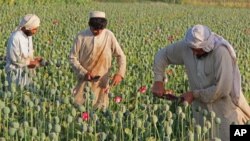The United Nations says opium production in Afghanistan hit a new high this year, raising questions about the internationally-funded counter-narcotics strategy in the war-shattered country.
The U.N. Office on Drugs and Crime (UNODC) says the opium harvest in Afghanistan jumped 17 percent from last year, and the increased cultivation could produce up to 6,400 tons of narcotics. The Afghan crop, it says, accounts for 90 percent of the heroin available in the world market.
Addressing a news conference in Kabul, U.N. officials said the alarming survey shows counter-narcotics efforts have failed
The U.N. agency’s regional representative, Andrey Avetisyan, called for finding better ways to fight drugs inside and beyond Afghanistan together with the Afghan government.
“Without tackling the problem of drugs seriously, no serious economic achievement is possible. To develop Afghanistan, to help Afghanistan with economic development we all together have to finally, seriously do something with the threat of narcotics. We understand with this alarming survey that a new approach to counter narcotics is needed,” said Avetisyan.
Avetisyan said political will and readiness are needed from the Afghan government and people for the anti-drugs fight to succeed. He said the United Nations is happy to note the new Afghan leadership understands the urgency.
“The new Afghan leadership understands very well that [the] illicit economy, including drugs is a very serious threat to the plans the new government has concerning economic development of Afghanistan. With this understanding comes a better possibility of common efforts to fight against drugs,” said Avetisyan.
The U.N. report recorded a seven percent increase in poppy cultivation area compared to the previous year, and 89 percent of it is located in nine Afghan provinces with a significant Taliban presence. Income from the drugs trade is believed to be funding insurgent activities.
Afghan Minister for Counter-Narcotics, Din Mohammad Rashedi, blamed this year's prolonged presidential election for the rise in poppy production.
He said there was not a single police officer available to his institution to destroy poppy fields as part of the government’s anti-narcotics drive because almost all the security forces were assigned to protect the election process.
The minister added that security concerns during the election also prompted the government to suspend the eradication campaign. But he defended the moves, saying the historic presidential election was the biggest priority for Afghanistan.
The United States is said to have spent nearly $8 billion on counter-narcotics efforts in Afghanistan in the past decade. The money was used to introduce programs encouraging Afghan farmers to switch to other cash crops, like wheat and fruit.
But analysts say the high income from poppy cultivation and the support framers receive from the Taliban and criminal groups, some linked to influential Afghans, outpay the official incentives. There are concerns the poppy cultivation may further rise in Afghanistan after the withdrawal of international forces from the country.




